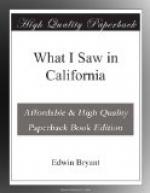I attended one evening a fandango given by Mr. Ridley, an English gentleman, whose wife is a Californian lady. Several of the senoras and senoritas from the ranchos of the vicinity were present. The Californian ladies dance with much ease and grace. The waltz appears to be a favourite with them. Smoking is not prohibited in these assemblies, nor is it confined to the gentlemen. The cigarita is freely used by the senoras and senoritas, and they puff it with much gusto while threading the mazes of the cotillion or swinging in the waltz.
I had the pleasure of being introduced, at the residence of Mr. Leidesdorff, to two young ladies, sisters and belles in Alta California. They are members of an old and numerous family on the Contra Costa. Their names are singular indeed, for, if I heard them correctly, one of them was called Donna Maria Jesus, and the other Donna Maria Conception. They were interesting and graceful young ladies, with regular features, symmetrical figures, and their dark eyes flashed with all the intelligence and passion characteristic of Spanish women.
Among the gentlemen with whom I met soon after my arrival at San Francisco, and whoso acquaintance I afterwards cultivated, were Mr. E. Grimes and Mr. N. Spear, both natives of Massachusetts, but residents of this coast and of the Pacific Islands, for many years. They may be called the patriarchs of American pioneers on the Pacific. After forming an acquaintance with Mr. G., if any one were to say to me that
“Old Grimes is dead, that good old man,”
I should not hesitate to contradict him with emphasis; for he is still living, and possesses all the charities and virtues which can adorn human nature, with some of the eccentricities of his name-sake in the song. By leading a life of peril and adventure on the Pacific Ocean for fifty years he has accumulated a large fortune, and is a man now proverbial for his integrity, candour, and charities. Both of these gentlemen have been largely engaged in the local commerce of the Pacific. Mr. S., some twenty-five or thirty years ago, colonized one of the Cannibal Islands, and remained upon it with the colony for nearly two years. The attempt to introduce agriculture into the island was a failure, and the enterprise was afterwards abandoned.




